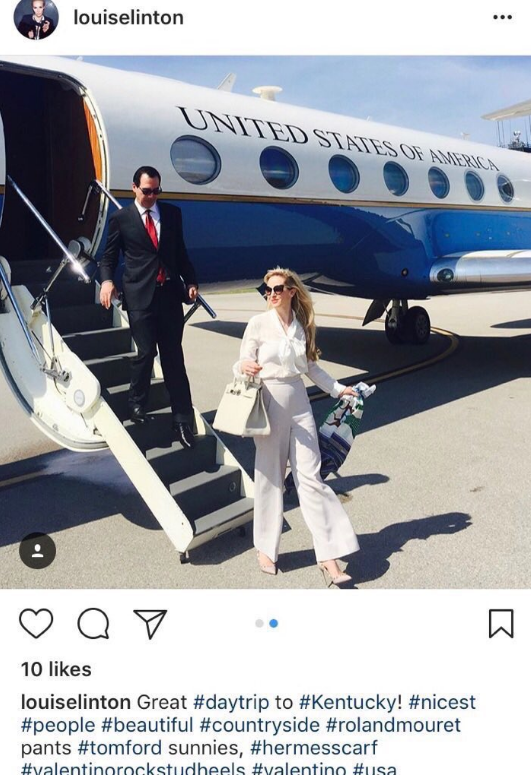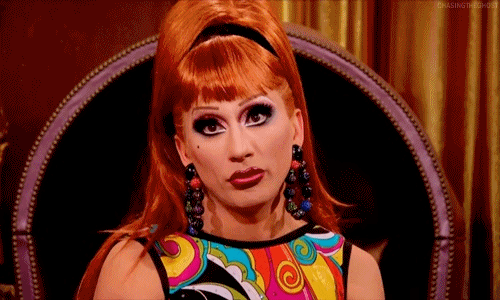August 2017
What We Can Learn About Personal Branding From Louise Linton's Instagram Fiasco
- by Alyson Shane
I'm not often one to bring together politics and my profession, but sometimes public lessons bear repeating.
This morning I was listening to the NPR Politics Podcast (which I high recommend for all you political wonks out there) and in the final section of their show they discuss stories they "can't let go." In the segment, Congressional reporter Susan Davis mentioned a fiasco involving the U.S. Treasury Secretary and his wife, Louise Linton.
Here's the story in a nutshell:
- The original post. Louise posted a photo on her Instagram account, which was public at the time but is now private, of herself and her husband disembarking from a government airplane (the photo has also now been deleted.)
- Humblebragging. The primary reason Louise came under fire was because she included several hashtags mentioning the multiple designer label items she was wearing. Commenters felt that she was bragging about her wealth and using a government plane.
- Feeding the trolls. One commenter left a comment which read: "Glad we could pay for your little getaway #deplorable" to which Louise responded with a comment where she claimed she and her husband were "bigger patriots" than the commenter (see below).
- Going viral. As a result of Louise's reaction to the comment, the story blew up all over news networks and drew a lot of attention from the media.
- Watchdogs get involved. The story viral highlighted the couple's trip on a government airplane, which let to the watchdog group Citizens for Responsibility and Ethics in Washington (CREW) filing a FOIA to investigate whether or not the couple planned the trip using the government plane specifically to get a good view of Monday's solar eclipse.
Breaking It Down
While Louise Linton's story isn't uncommon - lots of people say/do things online which acerbate a situation, after all - it's relevant because it's a pertinent example of how a mismanaged personal brand can have far-reaching negative consequences for the individual.
Let's explore in more detail:

The Original Post
Let's start with the facts: Louise Linton is married to a politician, which means that she is going to come under just as much fire and scrutiny as her husband. This is normal, but we live in times which are defined by the growing gap in inequality between the 1% and the poor, especially in the United States.
As a result, someone in her position needs to be especially careful about what she shares as she builds her personal brand, and the role that information plays in a larger narrative about herself and her husband, Republicans, and wealth inequality in America.
Obviously none of these thoughts were present when she posted her photo to Instagram. Honestly, the photo itself isn't terribly troublesome; it shows the couple walking off a government plane and looks like your typical "politicians going to and from places" photo that we've seen of basically every politician at some point in time.
The problem was that she used the post as an opportunity to showcase the variety of designer items she was wearing. By deliberately including these hashtags she went out of her way to flaunt her wealth, which doesn't bode well in a time when the income gap in America is as worse as it's ever been.
As a result, some people got upset.
The Fallout
Of the many comments left on the post, this one seemed to be particularly upsetting for Louise:

She responded with a lengthy, condescending comment which included the following excerpt:
“Cute! Aw!!! Did you think this was a personal trip?! Adorable! Do you think the US govt paid for our honeymoon or personal travel?! Lololol. Have you given more to the economy than me and my husband? Either as an individual earner in taxes OR in self sacrifice to your country?”

In the immortal words of Bianca DelRio: "Really, Queen?"
In addition to being incredibly condescending, Louise's comment strikes a few critical nerves here:
- She's deliberately dismissive of the commenter from the get-go.
- She flat-out denies that her trip was a personal one.*
- She insults the commenter by insinuating that she and her husband "give more" because they pay more in taxes... ostensibly because they earn more.
- She accuses the commenter of not being as patriotic as herself and her husband as a result of their tax contributions.
*(which has since turned out not to be completely true)
For someone who lives in the public eye, and who is married to a wealthy and influential politician whose effectiveness within government depends on his ability to identify with and relate to his electorate, this was about the worst possible comment she could have made.
In addition to breaking the number one rule of the internet (don't feed the trolls), her comment aggravated the situation because it clearly demonstrated that she thinks she doesn't see herself as someone who can relate to, or is even on the same playing field as, the people commenting on her photo. And this is probably true: if she can afford a Hermez scarf, Tom Ford sunglasses, and Valentino heels (among others) then she's clearly in a significantly different place than many of her followers.
However: that doesn't make it appropriate to point it out, especially in the way she did.
Coming Under Fire
The most fascinating aspect of this story was that her Instagram fight went viral, and wound up attracting the attention of the CREW watchdog group.
Now, because Louise didn't properly manage her personal brand, she and her husband are coming under fire for potentially using government aircraft for a personal excursion and are the subject of increased scrutiny and media coverage.
We often hear the expression There's no such thing as bad publicity, but in this case I'd be willing to bet that Louise wishes she'd never posted the photo at all. Primarily because she's since deleted the image and made her account Private.
Why Is Her Situation Different?
We live in the age of the Instagram influencers, and there are thousands (maybe more) of users who have built up followings, established relationships with brands, and build personal media empires based on using hashtags to establish influence and get in front of major retailers, agents, brand managers, and the like.
One could argue that, as a small-time actress, Louise was just trying to get in front of the brands she'd like to work with, and I'm inclined to agree that that's probably exactly what she was doing.
So what makes Louise's situation different? Simple: she's married to a politician.
This fact shifts the perception of her personal brand away from "small-time actor and budding influencer" to "politician's wife flaunting their wealth." It means that what she says and does is much more likely to come under fire, which means she needs to be extra-mindful of how she presents herself and her lifestyle online.
When building our personal brands we need to be mindful of the ways in which others will perceive what we post, say, and do. Of course, we can't please everyone all the time, but part of developing a strong personal brand is identifying our positive strengths, showcasing our passions, and doing our best to be a supportive and inclusive member of whichever communities we're a part of.
Louise Linton's Instagram post did none of those things, and by engaging in a comment fight she further undermined any credibility she may have had by demonstrating that she saw herself as being on a pedestal compared to the average American.
What Can We Learn?
Louise Linton's Instagram fiasco can be summed up in a few key points which should be seared into the minds of anyone attempting to build a personal brand:
- Like Kendrick Lamar says: Be humble. Part of building an effective personal brand is telling a story of growth and progress, so sharing success stories, collaborations, unique opportunities and experiences, and the like is often part of that process. But going out of your way to publicly flaunt your wealth is never cool or relatable; in fact, it's usually the opposite.
- Think before you post. We're all guilty of posting dumb stuff from time to time, but the larger our personal brands become, the more we need to think critically about what we say and do, and how it may make others feel.
- Ask yourself: who will connect with this content? Louise Linton is a politician's wife, which means the majority of the people who engage with her content are either people who like or dislike her husband and what he represents to them. Even if Louise's primary goal with her content was to get in front of designer brands and high-end influencers, she should have been more aware that the majority of people paying attention to what she's doing are people who can't afford to wear multiple designer pieces to take a ride on an airplane, which is going to garner more negative feedback than positive.
- Don't feed the trolls. Just don't do it.
- If you *absolutely have to comment back*, again: be humble. Apologize. Play nice and be civil. We win more friends with honey than with vinegar, after all, and if Louise had just apologized or been more demure in her response the public fallout, media coverage, and subsequent CREW involvement may never have happened.
At the end of the day, building a strong personal brand doesn't happen overnight, and it takes concerted effort to continue to build momentum and share content which resonates with your audience and projects the best version of yourself forward.
There are lots of ways you can connect with your target audience, get in front of brands and labels, and establish yourself as an influencer in your niche.
Just try not to take the Louise Linton approach when you do.
Do you have any personal branding horror stories, or suggestions for what Louise could have done instead? Tweet at me or tell me in the comments!
